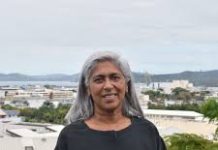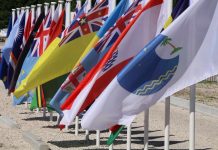By Meg Keen
Their standing slipped during COVID-19, but China is not vacating the space. Their meddling in political and economic affairs have raised concerns. Last year, the West was shocked when Solomon Islands signed a security pact with China, inclusive of Chinese police training.
Australia and the U.S sprang into action.
Australia has increased its aid and support to the region significantly – aid increased by $900 million (US$598 million) in October, and the recent budget provided an additional $1.9 billion (US$1.2 billion), mainly for security.
The U.S, though missing its presidential cameo, is ramping up re-engagement after a long absence. Last year Biden hosted the Pacific islands – U.S Summit and pledged $810 million (US$538 million) over the next decade (if Congress approves the whole package, no certainty). The U.S acknowledges it is playing “catch up” – it needs to not only show up, it needs to deliver.
When the diplomatic red carpets are rolled up, development and security deficits in the region will remain.
Biden was only going to be on the ground in PNG for about three hours; Blinken won’t be around much longer. Initiative signing ceremonies might be delayed but not ditched. The U.S-PNG Defence Co-operation Agreement (DCA) is still being negotiated but is likely to significantly increase U.S activity in PNG’s waters and land-based facilities.
It will do that, according to an unverified draft via more visits, joint training, and maritime surveillance. There will also be a U.S Coast Guard Shiprider Agreement that will include PNG officers in US patrols.
Prime Minister Marape referred to the agreement as the U.S “stepping out” as a security partner. Some feel it may be overstepping, but there are no details yet to judge. The PNG government wants to better secure its maritime territories and build its security capabilities. Its stated preference is to work with traditional partners and build on historic ties – a sovereign choice. If security gaps occur, like other Pacific countries, it might look elsewhere.
Modi won’t be disappointed that Biden isn’t available to steal his show. The Islands’ Forum announcements may not be as grand as the U.S agenda, but they will demonstrate commitment, despite their small footprint in the region. It will likely (again) offer a plethora of MOUs from business, technical assistance to finance.
Unfortunately, as the Pacific knows, MOUs are not binding and not all get action. Support for climate action and small development grants might also be on offer. But mostly the Pacific countries would like to see more trade access, current trade with the biggest regional economy, PNG, is only about US$200 million a year.
To create a secure and stable region, growing levels of poverty and inequality have to be addressed. It is estimated that without action, people living in poverty could soar above 25 percent of the population in countries like PNG; even in Fiji poverty is staying stubbornly high. When there is economic and human insecurity and deprivation, there can be no national security.
The attraction of our rival China is not its policing and defence – Australia and traditional partners are the Pacific security partner of choice for most (including Solomon Islands). Former Pacific Islands Forum Leader Meg Taylor put it simply: China represents access – access to markets, finance and infrastructure. It’s why the Pacific wants to remain Friends to All.
PNG is pursuing a Free Trade Agreement with China, in addition to closer ties with Quad members – Australia, India, Japan and the U.S. The Pacific countries need more action to facilitate trade, economic opportunity and climate-resilient development.
Australia’s Quad meeting was scuppered by Biden’s home problems, but there will be a quick meeting in the margins of the G7 meeting in Hiroshima this weekend.
Beyond maritime security and countering the rise of China, the Quad has an agenda inclusive of regional health security, humanitarian assistance and disaster relief, critical technology access, and economic recovery from COVID-19 – that’s attractive to Pacific countries.
It’s the time to put more actions behind words and show collective leadership for regional benefit.
After all, when the diplomatic red carpets are rolled up, development and security deficits in the region will remain.
SOURCE: AFR/PACNEWS


















